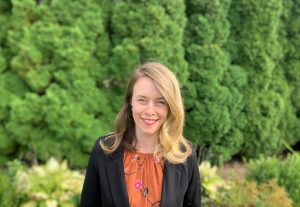
The Department of Psychology is pleased to welcome our newest faculty member, Kate Walsh. Walsh earned her PhD in Clinical Psychology from the University of Nebraska-Lincoln and completed T32 postdoctoral fellowships in traumatic stress and substance use epidemiology at the Medical University of South Carolina and the Mailman School of Public Health at Columbia University, respectively. Additionally, she is a licensed clinical psychologist in New York state and plans to become licensed in Wisconsin.
Hometown: Benton, Maine
Previous position: Assistant Professor, Yeshiva University in New York, NY
How did you get into your field of research? My interest in sexual violence was piqued during an undergraduate research assistantship that involved screening potential participants for a NIH treatment outcome study for PTSD. I spoke to numerous individuals who reported not just one experience of sexual violence but multiple experiences of sexual violence over their lifetimes. I turned to the research literature on sexual revictimization and found that as many as one in two survivors of sexual violence reported two or more experiences in their lifetime, although the mechanisms underlying revictimization risk were poorly understood. I subsequently completed an honors thesis on the topic and have established a multidisciplinary research program to better understand the prevalence of and pathways to sexual violence as well as develop and test methods to ameliorate suffering when exposed to violence.
What attracted you to UW–Madison? I was hired to lead an interdisciplinary research cluster on sexual violence so I am very excited about the resources and commitment of the university to the issues I study. I am also thrilled about the opportunity to work with brilliant faculty from other disciplines who bring different perspectives to issues of how to prevent and respond to sexual violence when it does occur.
What was your first visit to campus like? The campus was warm and welcoming and my interviews with faculty and students were very intellectually stimulating. I was impressed by the variety of resources available to faculty, which will allow my research program to thrive.
What’s one thing you hope students who take a class with you will come away with? I hope students gain new perspectives about risk factors for sexual violence as well as the myriad outcomes that can manifest in response to exposure to sexual violence victimization. I also hope students feel energized to engage in work around prevention and intervention, particularly for underrepresented groups.
Is there a way your field of study can help the world endure and recover from the COVID-19 pandemic that has affected the health, finances and lifestyle of so many? The field of clinical psychology has been very attentive to the mental health needs that have arisen in response to COVID-19, ranging from burnout and secondary traumatic stress among healthcare providers to depression and loneliness among those of us who have been isolating from friends and family during quarantine to stress in response to job loss and economic challenges. Violence rates have increased during the pandemic yet help-seeking has been more challenging. To better understand these unique challenges, my graduate student, Stephanie Ward, and I are developing a study to better understand how the pandemic has influenced sexual violence risk and reporting practices among undergraduate students. However, it is my hope that as we rebuild our economy, we attend to some of the gaps in our healthcare systems that have created stark inequities in well-being and care seeking.
Do you feel your work relates in any way to the Wisconsin Idea? Although one of my lines of research is focused on reducing the prevalence of sexual violence victimization and perpetration on the UW campus, data are clear that prevention strategies need to begin well before students matriculate on college campuses. To that end, I have a study of adolescent girls and maternal caregivers that assesses communication and emotion regulation in the context of sexual risk that I would like to broaden to include men and boys as well as those who identify as gender expansive. The aim of this study is to develop programming focused on building healthy relationships. I am also very interested in sexual violence in other high-risk populations (prison, the military, adolescents and young adults not in college, LGBTQIA+ populations, etc) as well as in the ways that those who have experienced sexual violence interact with legal and law enforcement systems. This broader work resonates well with the Wisconsin idea in that it aims to reduce violence and improve well-being in the broader community and in the context of systems outside of academia.
What’s something interesting about your area of expertise you can share that will make us sound smarter during video chats (and eventually parties)? Myths and Misconceptions: In contrast to the public’s perception that “real rapes” involve a stranger with a weapon using force, national data indicate that the majority of rapes are perpetrated by a known assailant, most typically current or former intimate partners or acquaintances, and involve methods other than force such as taking advantage when someone is too drunk or high to consent.
Hobbies/other interests: Running, yoga, barre, reading, cooking, raising two young kids ????